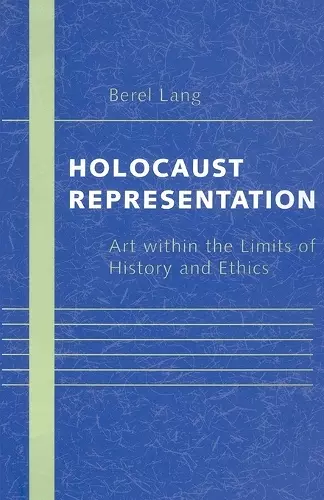Holocaust Representation
Art within the Limits of History and Ethics
Format:Paperback
Publisher:Johns Hopkins University Press
Published:15th Sep '03
Currently unavailable, and unfortunately no date known when it will be back

Berel Lang has achieved in these essays a remarkable and compelling piece of philosophical literary criticism. He aims for nothing less than a demonstration that writings on the Holocaust, however imaginative, cannot escape the form or fact of the history of that event. There is, in this unique case, an internal relationship between truth and poetic representation. It is a powerful and sobering analysis of the limits of art. -- Arthur C. Danto, Columbia University With his profound philosophical grasp of both aesthetic and ethical issues at play in Holocaust literature and art, Berel Lang brings great clarity to the very difficult and complex issues surrounding Holocaust representation-whether by survivors or by the next generation. -- James E. Young, University of Massachusetts, Amherst Displaying at once the intellectual precision of a philosopher, the verbal sensitivity of a literary critic, and the concreteness of a historian, Berel Lang has produced an immensely appealing book that will attract readers throughout the humanities. Holocaust Representation brilliantly rethinks and redirects that flourishing new genre, the book about Holocaust writing. -- Herbert Lindenberger, Stanford University Berel Lang offers a compellingly original, subtle, and provocative meditation on those historical and ethical constraints that invariably limit the representation of the 'unrepresentable,' the speaking of the 'unspeakable.' Joining philosophical inquiry and historical analysis, literary criticism and art history, Lang presents a new interpretation of the 'blurring'-of literary genres, of artistic forms, of historical discourses, of stylistic conventions-that, in the afterwards of history and memory, extreme trauma imposes on representation. -- Richard Stamelman, Williams College Berel Lang's writings on Holocaust representations reveal the broad range of aesthetic and ethical complexities that define this important subject. Lang's essays, historically informed and critically astute, warrant and will amply reward the most careful reading. -- Alvin H. Rosenfeld, Indiana University
At an extreme, all Holocaust representation must face the test of whether its referent would not be more authentically expressed by silence-that is, by the absence of representation.Since Theodor Adorno's attack on the writing of poetry "after Auschwitz," artists and theorists have faced the problem of reconciling the moral enormity of the Nazi genocide with the artist's search for creative freedom. In Holocaust Representation, Berel Lang addresses the relation between ethics and art in the context of contemporary discussions of the Holocaust. Are certain aesthetic means or genres "out of bounds" for the Holocaust? To what extent should artists be constrained by the "actuality" of history-and is the Holocaust unique in raising these problems of representation? The dynamics between artistic form and content generally hold even more intensely, Lang argues, when art's subject has the moral weight of an event like the Holocaust. As authors reach beyond the standard conventions for more adequate means of representation, Holocaust writings frequently display a blurring of genres. The same impulse manifests itself in repeated claims of historical as well as artistic authenticity. Informing Lang's discussion are the recent conflicts about the truth-status of Benjamin Wilkomirski's "memoir" Fragments and the comic fantasy of Roberto Benigni's film Life Is Beautiful. Lang views Holocaust representation as limited by a combination of ethical and historical constraints. As art that violates such constraints often lapses into sentimentality or melodrama, cliche or kitsch, this becomes all the more objectionable when its subject is moral enormity. At an extreme, all Holocaust representation must face the test of whether its referent would not be more authentically expressed by silence-that is, by the absence of representation.
Holocaust Representation tackles the thorny subject of ethics and art as they bear on works commemorating or referring to the Holocaust. -- James Malpas Art Newspaper
ISBN: 9780801877452
Dimensions: 216mm x 140mm x 10mm
Weight: 408g
192 pages